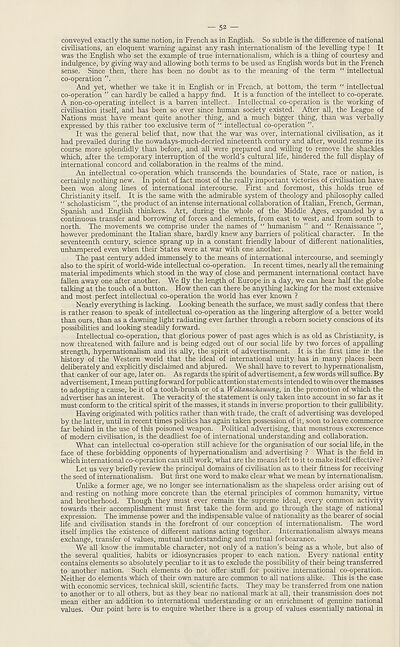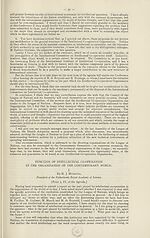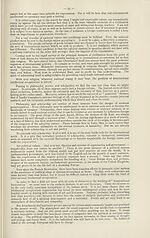International > Proceedings of the second General conference of national committees on intellectual co-operation, Paris, July 5th-9th, 1937
(54)
Download files
Complete book:
Individual page:
Thumbnail gallery: Grid view | List view

_ 52 —
conveyed exactly the same notion, in French as in English. So subtle is the difference of national
civilisations, an eloquent warning against any rash internationalism of the levelling type ! It
was the English who set the example of true internationalism, which is a thing of courtesy and
indulgence, by giving way and allowing both terms to be used as English words but in the French
sense. Since then, there has been no doubt as to the meaning of the term “ intellectual
co-operation ”.
And yet, whether we take it in English or in French, at bottom, the term “ intellectual
co-operation ” can hardly be called a happy find. It is a function of the intellect to co-operate.
A non-co-operating intellect is a barren intellect. Intellectual co-operation is the working of
civilisation itself, and has been so ever since human society existed. After all, the League of
Nations must have meant quite another thing, and a much bigger thing, than was verbally
expressed by this rather too exclusive term of " intellectual co-operation ”.
It was the general belief that, now that the war was over, international civilisation, as it
had prevailed during the nowadays-much-decried nineteenth century and after, would resume its
course more splendidly than before, and all were prepared and willing to remove the shackles
which, after the temporary interruption of the world’s cultural life, hindered the full display of
international concord and collaboration in the realms of the mind.
An intellectual co-operation which transcends the boundaries of State, race or nation, is
certainly nothing new. In point of fact most of the really important victories of civilisation have
been won along lines of international intercourse. First and foremost, this holds true of
Christianity itself. It is the same with the admirable system of theology and philosophy called
“ scholasticism ”, the product of an intense international collaboration of Italian, French, German,
Spanish and English thinkers. Art, during the whole of the Middle Ages, expanded by a
continuous transfer and borrowing of forces and elements, from east to west, and from south to
north. The movements we comprise under the names of “ humanism ” and " Renaissance ”,
however predominant the Italian share, hardly knew any barriers of political character. In the
seventeenth century, science sprang up in a constant friendly labour of different nationalities,
unhampered even when their States were at war with one another.
The past century added immensely to the means of international intercourse, and seemingly
also to the spirit of world-wide intellectual co-operation. In recent times, nearly all the remaining
material impediments which stood in the way of close and permanent international contact have
fallen away one after another. We fly the length of Europe in a day, we can hear half the globe
talking at the touch of a button. How then can there be anything lacking for the most extensive
and most perfect intellectual co-operation the world has ever known ?
Nearly everything is lacking. Looking beneath the surface, we must sadly confess that there
is rather reason to speak of intellectual co-operation as the lingering afterglow of a better world
than ours, than as a dawning light radiating ever farther through a reborn society conscious of its
possibilities and looking steadily forward.
Intellectual co-operation, that glorious power of past ages which is as old as Christianity, is
now threatened with failure and is being edged out of our social life by two forces of appalling
strength, hypernationalism and its ally, the spirit of advertisement. It is the first time in the
history of the Western world that the ideal of international unity has in many places been
deliberately and explicitly disclaimed and abjured. We shall have to revert to hypernationalism,
that canker of our age, later on. As regards the spirit of advertisement, a few words will suffice. By
advertisement, I mean putting forward for public attention statements intended to win over the masses
to adopting a cause, be it of a tooth-brush or of a Weltanschauung, in the promotion of which the
advertiser has an interest. The veracity of the statement is only taken into account in so far as it
must conform to the critical spirit of the masses, it stands in inverse proportion to their gullibility.
Having originated with politics rather than with trade, the craft of advertising was developed
by the latter, until in recent times politics has again taken possession of it, soon to leave commerce
far behind in the use of this poisoned weapon. Political advertising, that monstrous excrescence
of modern civilisation, is the deadliest foe of international understanding and collaboration.
What can intellectual co-operation still achieve for the organisation of our social life, in the
face of these forbidding opponents of hypernationalism and advertising ? What is the field in
which international co-operation can still work, what are the means left to it to make itself effective ?
Let us very briefly review the principal domains of civilisation as to their fitness for receiving
the seed of internationalism. But first one word to make clear what we mean by internationalism.
Unlike a former age, we no longer see internationalism as the shapeless order arising out of
and resting on nothing more concrete than the eternal principles of common humanity, virtue
and brotherhood. Though they must ever remain the supreme ideal, every common activity
towards their accomplishment must first take the form and go through the stage of national
expression. The immense power and the indispensable value of nationality as the bearer of social
life and civilisation stands in the forefront of our conception of internationalism. The word
itself implies the existence of different nations acting together. Internationalism always means
exchange, transfer of values, mutual understanding and mutual forbearance.
We all know the immutable character, not only of a nation’s being as a whole, but also of
the several qualities, habits or idiosyncrasies proper to each nation. Every national entity
contains elements so absolutely peculiar to it as to exclude the possibility of their being transferred
to another nation. Such elements do not offer stuff for positive international co-operation.
Neither do elements which of their own nature are common to all nations alike. This is the case
with economic services, technical skill, scientific facts. They may be transferred from one nation
to another or to all others, but as they bear no national mark at all, their transmission does not
mean either an addition to international understanding or an enrichment of genuine national
values. Our point here is to enquire whether there is a group of values essentially national in
conveyed exactly the same notion, in French as in English. So subtle is the difference of national
civilisations, an eloquent warning against any rash internationalism of the levelling type ! It
was the English who set the example of true internationalism, which is a thing of courtesy and
indulgence, by giving way and allowing both terms to be used as English words but in the French
sense. Since then, there has been no doubt as to the meaning of the term “ intellectual
co-operation ”.
And yet, whether we take it in English or in French, at bottom, the term “ intellectual
co-operation ” can hardly be called a happy find. It is a function of the intellect to co-operate.
A non-co-operating intellect is a barren intellect. Intellectual co-operation is the working of
civilisation itself, and has been so ever since human society existed. After all, the League of
Nations must have meant quite another thing, and a much bigger thing, than was verbally
expressed by this rather too exclusive term of " intellectual co-operation ”.
It was the general belief that, now that the war was over, international civilisation, as it
had prevailed during the nowadays-much-decried nineteenth century and after, would resume its
course more splendidly than before, and all were prepared and willing to remove the shackles
which, after the temporary interruption of the world’s cultural life, hindered the full display of
international concord and collaboration in the realms of the mind.
An intellectual co-operation which transcends the boundaries of State, race or nation, is
certainly nothing new. In point of fact most of the really important victories of civilisation have
been won along lines of international intercourse. First and foremost, this holds true of
Christianity itself. It is the same with the admirable system of theology and philosophy called
“ scholasticism ”, the product of an intense international collaboration of Italian, French, German,
Spanish and English thinkers. Art, during the whole of the Middle Ages, expanded by a
continuous transfer and borrowing of forces and elements, from east to west, and from south to
north. The movements we comprise under the names of “ humanism ” and " Renaissance ”,
however predominant the Italian share, hardly knew any barriers of political character. In the
seventeenth century, science sprang up in a constant friendly labour of different nationalities,
unhampered even when their States were at war with one another.
The past century added immensely to the means of international intercourse, and seemingly
also to the spirit of world-wide intellectual co-operation. In recent times, nearly all the remaining
material impediments which stood in the way of close and permanent international contact have
fallen away one after another. We fly the length of Europe in a day, we can hear half the globe
talking at the touch of a button. How then can there be anything lacking for the most extensive
and most perfect intellectual co-operation the world has ever known ?
Nearly everything is lacking. Looking beneath the surface, we must sadly confess that there
is rather reason to speak of intellectual co-operation as the lingering afterglow of a better world
than ours, than as a dawning light radiating ever farther through a reborn society conscious of its
possibilities and looking steadily forward.
Intellectual co-operation, that glorious power of past ages which is as old as Christianity, is
now threatened with failure and is being edged out of our social life by two forces of appalling
strength, hypernationalism and its ally, the spirit of advertisement. It is the first time in the
history of the Western world that the ideal of international unity has in many places been
deliberately and explicitly disclaimed and abjured. We shall have to revert to hypernationalism,
that canker of our age, later on. As regards the spirit of advertisement, a few words will suffice. By
advertisement, I mean putting forward for public attention statements intended to win over the masses
to adopting a cause, be it of a tooth-brush or of a Weltanschauung, in the promotion of which the
advertiser has an interest. The veracity of the statement is only taken into account in so far as it
must conform to the critical spirit of the masses, it stands in inverse proportion to their gullibility.
Having originated with politics rather than with trade, the craft of advertising was developed
by the latter, until in recent times politics has again taken possession of it, soon to leave commerce
far behind in the use of this poisoned weapon. Political advertising, that monstrous excrescence
of modern civilisation, is the deadliest foe of international understanding and collaboration.
What can intellectual co-operation still achieve for the organisation of our social life, in the
face of these forbidding opponents of hypernationalism and advertising ? What is the field in
which international co-operation can still work, what are the means left to it to make itself effective ?
Let us very briefly review the principal domains of civilisation as to their fitness for receiving
the seed of internationalism. But first one word to make clear what we mean by internationalism.
Unlike a former age, we no longer see internationalism as the shapeless order arising out of
and resting on nothing more concrete than the eternal principles of common humanity, virtue
and brotherhood. Though they must ever remain the supreme ideal, every common activity
towards their accomplishment must first take the form and go through the stage of national
expression. The immense power and the indispensable value of nationality as the bearer of social
life and civilisation stands in the forefront of our conception of internationalism. The word
itself implies the existence of different nations acting together. Internationalism always means
exchange, transfer of values, mutual understanding and mutual forbearance.
We all know the immutable character, not only of a nation’s being as a whole, but also of
the several qualities, habits or idiosyncrasies proper to each nation. Every national entity
contains elements so absolutely peculiar to it as to exclude the possibility of their being transferred
to another nation. Such elements do not offer stuff for positive international co-operation.
Neither do elements which of their own nature are common to all nations alike. This is the case
with economic services, technical skill, scientific facts. They may be transferred from one nation
to another or to all others, but as they bear no national mark at all, their transmission does not
mean either an addition to international understanding or an enrichment of genuine national
values. Our point here is to enquire whether there is a group of values essentially national in
Set display mode to:
![]() Universal Viewer |
Universal Viewer | ![]() Mirador |
Large image | Transcription
Mirador |
Large image | Transcription
Images and transcriptions on this page, including medium image downloads, may be used under the Creative Commons Attribution 4.0 International Licence unless otherwise stated. ![]()
| League of Nations > International > Proceedings of the second General conference of national committees on intellectual co-operation, Paris, July 5th-9th, 1937 > (54) |
|---|
| Permanent URL | https://digital.nls.uk/195217877 |
|---|
| Shelfmark | LN.XII |
|---|
| Description | Over 1,200 documents from the non-political organs of the League of Nations that dealt with health, disarmament, economic and financial matters for the duration of the League (1919-1945). Also online are statistical bulletins, essential facts, and an overview of the League by the first Secretary General, Sir Eric Drummond. These items are part of the Official Publications collection at the National Library of Scotland. |
|---|---|
| Additional NLS resources: |
|

